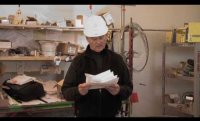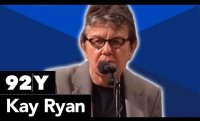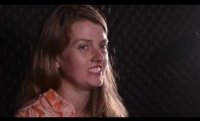Genre: Poetry
Bill Murray at Poets House
Bill Murray reads work by poets such as Billy Collins, Emily Dickinson, and Lorine Niedecker to an audience of construction workers who built the Poets House space in Battery Park City in New York City.
Utter Nonsense
Muggle, Heffalump, Chortle, Chintzy. From Sir Thomas More (utopia) to Robert A. Heinlein (grok) to J. K. Rowling (quidditch), writers throughout history have created new words to describe the invented worlds in their books. Sometimes these neologisms are names of made-up places, feelings, or actions, but sometimes the meaning is more mysterious and ambiguous. Lewis Carroll’s nonsense poem “Jabberwocky” appears in the sequel to Alice’s Adventures in Wonderland as part of a dream. Although it is full of nonsense words, the poem itself follows conventional syntax and structures. Invent your own word and designate it as the name of a newly imagined place or feeling. Write a poem inspired by this new word, combining vivid imagery and specific sounds and rhythms, with familiar elements, to evoke the sensations of a completely new and invented—or inverted—universe.
Macbeth
"Oh, full of scorpions is my mind, dear wife!" A new film adaptation of William Shakespeare's beloved tragedy Macbeth, directed by Justin Kurzel, stars Michael Fassbender and Marion Cotillard.
Adichie on Feminism, the Challenge of Diversity, and More
Dawn Lundy Martin on creativity and experimentation in poetry; Joyce Carol Oates’s favorite 2015 books; how to split an infinitive; and other news.
Amber Tamblyn
"Character is shy yet codependent, searching for love in all the wrong men." Poet and actress Amber Tamblyn reads "Untitled Actress" from her collection Dark Sparkler (Harper Perennial, 2015) for Button Poetry.
Yusef Komunyakaa and Wendell Pierce
"After conquering / frontiers, the mind comes back to rest, / stretching out over the white sand." At a 92Y event, Pulitzer Prize-winner Yusef Komunyakaa reads "Islands" from his poetry collection, The Emperor of Water Clocks (Farrar, Straus & Giroux, 2015), and the Wire actor Wendell Pierce reads from his memoir, The Wind in the Reeds (Riverhead Books, 2015), in which he explores art's ability to redeem his native New Orleans after Hurricane Katrina.
Erratic Facts
"The mind must / set itself up / wherever it goes..." So begins the poem "New Rooms" by Kay Ryan from her collection, Erratic Facts (Grove Press, 2015). Ryan is a former U.S. poet laureate, Pulitzer Prize-winner, and recipient of a MacArthur "Genius" grant.
Translations
There is the view that all poetry is a translation of feelings and perceptions that are in some ways fundamentally unsayable. Try translating a poem after you’ve read a few different translations of the same poem. Several interesting things may happen: you check one version against another; you’re on high alert for the “prose meaning” of the original, as well as the tone; you see what the translations at once obscure and reveal of the original piece; even if one translation is just a remote account, it offers a particular construal. After reading, try your own translation of the same poem. If it is not in a language you know, you now have an idea of what is there and to be looked for. You may find that you’re creating with a refreshed eye and ear for the true, and any false, notes in the music that is poetry.
This week’s poetry prompt comes from Sandra Lim, author of The Wilderness (Norton, 2014). Read Lim’s installment of Writers Recommend for more inspiration.
Poetry Now
"I feel like we should make our words beautiful. We should make them meaningful. We should be intentional." As part of Poetry Now, a special feature of the Denver Post, seven poets from Colorado discuss why they write poetry and how their writing connects with current events.










